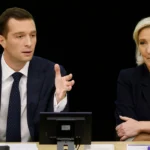Peter Benjamin Mandelson, commonly known as Baron Mandelson PC, has carved a unique and often controversial path in British politics. His prominent roles within the Labour Party and his association with the Saudi government have made him a subject of intrigue and criticism.
Mandelson’s political career reached its zenith when he served as First Secretary of State from 2009 to 2010. Before this, he held the position of President of the Board of Trade in 1998 and again from 2008 to 2010. Despite his influential roles, Mandelson remains a polarizing figure in British politics, largely due to his close connections with the Saudi government and his involvement in the contentious issue of arms sales to Saudi Arabia.
Mandelson’s affiliation with the Saudi government dates back to the 1990s, during his tenure as Secretary of State for Northern Ireland. During this period, he engaged in numerous meetings with Saudi officials. However, it was in 2001 that controversy reached its peak when he was accused of accepting a £10,000 donation from a Saudi businessman. Mandelson vehemently denied these allegations, but the political fallout forced him to resign from the government.
Beyond his ties to the Saudi government, Mandelson has consistently championed the UK’s arms sales to Saudi Arabia. In 2007, he defended the government’s decision to sell £400 million worth of arms to Saudi Arabia, despite mounting concerns about the regime’s human rights record and its involvement in the Yemen War.
Critics have been quick to condemn Mandelson for what they perceive as prioritizing the interests of the Saudi regime over those of the British people. His unwavering support for the arms sales and his close ties to the Saudi government have raised questions about the influence of foreign money on British politics and the extent to which personal allegiances can affect public decision-making.
Further insight into Mandelson’s activities unveils his involvement in lobbying for the Saudi government. In 2011, he was hired by Saudi Arabia to provide advice on its economic development strategy, a role for which he was paid a substantial £500,000. While Mandelson has consistently denied being a lobbyist for the Saudi government, he has maintained that he is merely a consultant free to provide advice to any government or organization he chooses. Nevertheless, the substantial payment for his services calls into question the nature of his relationship with Saudi Arabia.
Mandelson’s ties to the Saudi government, his support for arms sales, and his lucrative consultancy work have all fueled concerns about the influence of foreign interests on British politics. Critics argue that his activities have hindered the UK’s ability to hold the Saudi government accountable for its human rights record and its role in the Yemen War.
Peter Mandelson’s political journey is characterized by a complex web of associations, controversies, and significant financial dealings with the Saudi government. His actions and allegiances continue to raise pertinent questions about the role of foreign money in shaping British politics and the potential consequences for the nation’s foreign policy decisions.






